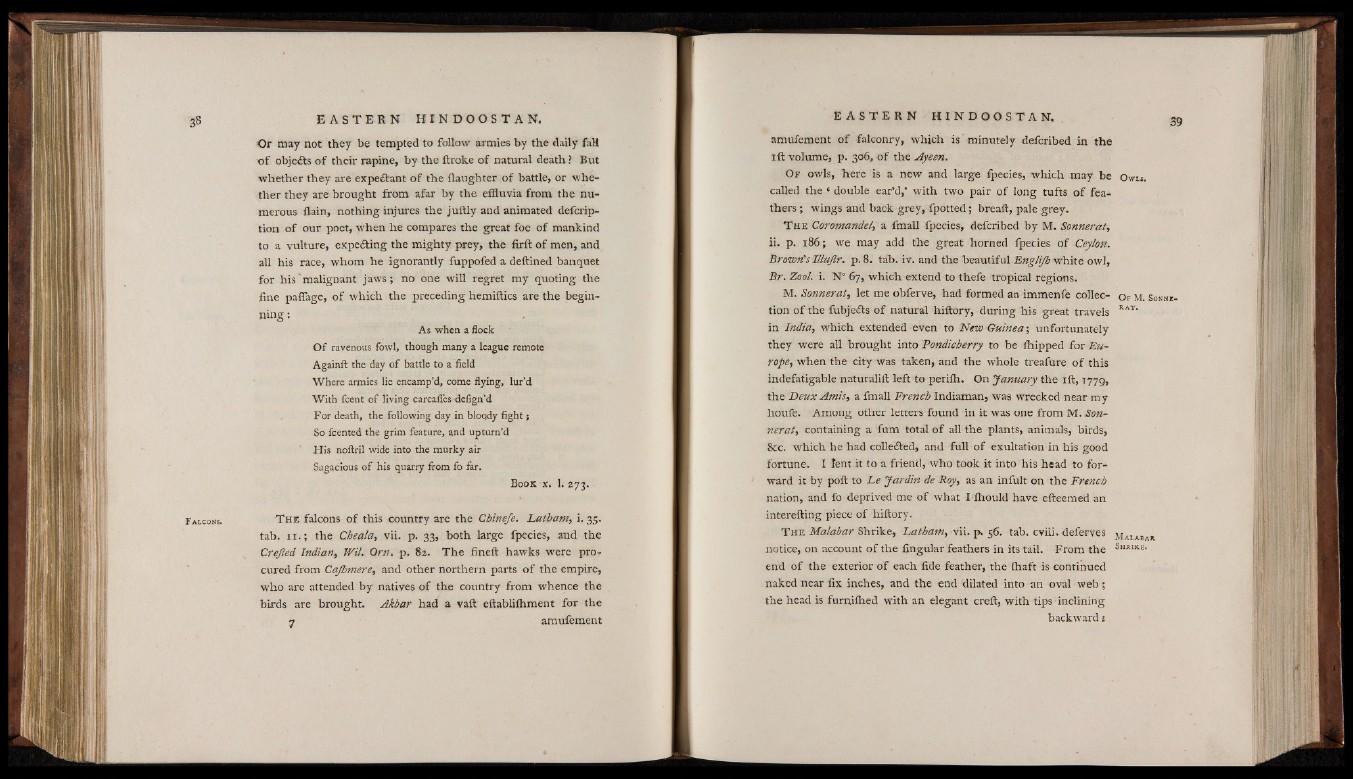
F alcons.
•Or may not they be tempted to follow armies by the daily fall
o f objeits of their rapine, by the ftroke of natural death ? But
whether they are expeftant of the flaughter of battle, or whether
they are brought from afar by the effluvia from the numerous
flain, nothing injures the juftly and animated defcrip-
tion o f our poet, when he compares the great foe o f mankind
to a vulture, expedting the mighty prey, the firft of men, and
all his race, whom he ignorantly fuppofed a deftined banquet
for his "malignant jaws; no one will regret my quoting the
fine pafiage, of which the preceding hemiftics are the beginning
:
As when a flock
Of ravenous fowl, though many a league remote
Againft the day of battle to a field
Where armies lie encamp’d, come flying, lur’d
With fcent of living carcafles defign’d
For death, the following day in bloqdy fight 5
So fcented the grim feature, and upturn’d
His noftril wide into the murky air
Sagacious of his quarry from fo far.
Book x. 1. 273.
T h e falcons o f this country are the Cbinefe. Latbam, i, 35.
tab. 1 1 .; the Cbeala, vii. p. 33, both large fpecies, and the
Crefted Indian, Wil. Qrn. p. 82. The fined: hawks were procured
from Cajhmere, and other northern parts o f the empire,
who are attended by natives o f the country from whence the
birds are brought. Akbar had a vaft eftabliihment for the
7 amufement
amufement o f falconry, which is minutely defcribed in the
lit volume, p. 306, o f the Ayeen.
Of owls, here is a new and large fpecies, which may be
called the ‘ double ear’d,' with two pair of long tufts o f feathers
; wings and back grey, fpotted ; bread:, pale grey.
T he Coromandel, a fmall fpecies, defcribed by M. Sonnerat,
ii. p. 186; we may add the great horned fpecies of Ceylon.
Brown's Illujlr. p. 8. tab. iv. and the beautiful Engli/bwhite owl,
Br. Zool. i. N° 67, which extend to thefe tropical regions.
M. Sonnerat, let me obferve, had formed an immenfe collection
of the fubjedts o f natural hiftory, during his great travels
in India, which extended even to New Guinea', unfortunately
they were all brought into Pondicherry to be fhipped for Europe,
when the city was taken, and the Whole treafure o f this
indefatigable naturalid left to perifh. On January the id , 1779,
the Deux Amis, a fmall French Indiaman, was wrecked near my
houfe. Among other letters found in it was one from M. Sonnerat,
containing a fum total of all the plants, animals, birds,
See. which he had colleited, and full of exultation in his good
fortune. I lent it to a friend, who took it into his head to forward
it by pod to Le Jardin de Roy, as an infult on the French
nation, and fo deprived me o f what I ihould have edeemed an
intereding piece of hidory.
T he Malabar Shrike, Latbam, vii. p. 56. tab. cviii. deferves
notice, on account of the Angular feathers in its tail. From the
end of the exterior o f each fide feather, the ihaft is continued
naked near fix inches, and the end dilated into an oval web ;
the head is furnilhed with an elegant cred, with tips inclining
backward s
OWL*.
O f M. S o n n e r
a t .
M a l a b a r
S h r i k e .